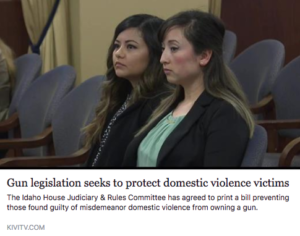IDAHO REP. WINTROW INTRODUCES LEGISLATION THAT WOULD ENHANCE LAW ENFORCEMENT OFFICER’S EFFORTS TO PROTECT VICTIMS OF DOMESTIC VIOLENCE
Boise – Rep. Melissa Wintrow, D-Boise, will introduce a proposal in the House Judiciary and Rules Committee to prohibit people convicted of domestic violence from having guns by making it a misdemeanor for anyone who has been convicted within the last two years of assault or battery against a household member to possess a firearm. A violation of this provision would be punishable as a misdemeanor –up to six months in jail and/or less than $1,000 fine.
The proposal applies to people who are already prohibited by federal law from owning or possessing a firearm and empowers Idaho law enforcement to protect women and families from violent abusers. This policy stays in line with 28 others states and the District of Columbia where people convicted of misdemeanor domestic violence are prohibited from buying or possessing guns[1].
Working with Rep. Wintrow worked on this legislation are survivors of guns violence, Laura and Judy Diaz, daughters of Amparo Godinez Diaz, whose story is detailed below, as well as Canyon County Sheriff Kieran Donahue, and Annie Pelletier of the Idaho Coalition Against Sexual and Domestic Violence.
Rep. Wintrow said she believes this law would help to prevent tragedies like the one that occurred in Wilder in 2015, when Amparo Godinez Sanchez was murdered by her husband, Erasmo Diaz.
Two years after “39-year-old Amparo Godinez Sanchez was brutally shot to death in her Wilder home, her three children have yet to find peace. The suspect in the killing — Erasmo Diaz, 52, Godinez’s husband and the children’s father — fled. His car was found soon after the June 11 shooting, abandoned 12 miles away in Adrian, Ore. Diaz hasn’t been seen since. […]
Erasmo Diaz was arrested in July 2008 after pushing and striking Godinez during an argument. Judy, then 14, and Laura, 17, stepped in and struck their father with objects to protect their mother. Diaz was arrested and charged with three felony counts of aggravated battery. He later pleaded guilty to misdemeanor charges and was sentenced to 90 days in jail and placed on probation for a year. A judge also returned three handguns confiscated from Diaz, despite the fact that federal law forbade him going forward from owning a firearm. Idaho has no corresponding state law, meaning the judge had no other recourse.”
Wilder, Idaho, sisters speak out after mother’s shooting death
“In Idaho, the federal law is the main tool used to deter relationship-related gun violence. That means only  federal prosecutors can bring an illegal weapons case against someone convicted of misdemeanor domestic abuse,” said Assistant U.S. Attorney Aaron Lucoff. “And generally, they become involved only if notified by a local agency that a prohibited person has a firearm or if it comes out during a federal investigation of other criminal activity.”
federal prosecutors can bring an illegal weapons case against someone convicted of misdemeanor domestic abuse,” said Assistant U.S. Attorney Aaron Lucoff. “And generally, they become involved only if notified by a local agency that a prohibited person has a firearm or if it comes out during a federal investigation of other criminal activity.”
“Does our office track people who have lost their rights to possess guns? The answer to that is no. No one in the federal government that I’m aware of does that,” Lucoff said. “There isn’t a list.”
Idaho Statesman: “Domestic violence: Gap in Idaho law let Wilder murder suspect get guns back
Wintrow said domestic violence affects millions of women across the country, and guns in the hands of domestic abusers can turn abuse into murder.
Women in the U.S. are 16 times more likely to be killed with a gun than women in other high-income countries, making this country the most dangerous in the developed world when it comes to gun violence against women[2].
Idaho is no exception from these disturbing national trends. In 2016, the Idaho State Police reported 6,084 incidents of violence between spouses, ex-spouses, and those in dating relationships[3]. Each day in Idaho, more than 850 victims of domestic violence and their children seek safety and services from community-based domestic violence programs[4].
The presence of a gun in a domestic violence situation makes it five times more likely that a woman will be killed[5], which is why federal law prohibits certain abusers from buying or possessing guns.
But not all states have the laws they need to protect victims of domestic violence—both to complement federal law and to fill gaps where Congress has failed to act.
Twenty-eight states and the District of Columbia have enacted bills that strengthen the laws keeping guns away from domestic abusers.
These measures have been taken up by state houses in every region of the country — they have passed almost uniformly with bipartisan majorities and have been signed into law by governors of both parties, including Republicans like Scott Walker, Chris Christie, Bobby Jindal, Robert Bentley, Gary Herbert, and Brian Sandoval.
Last year in Utah, legislators passed a similar measure aimed to protect women from domestic abusers. The bill, HB206, was introduced by Senator Deidre Henderson (R) and passed the House unanimously and was signed into law by Governor Herbert.
Polling[6] demonstrates that Idahoans support these efforts. In fact, when asked, two in three Idahoans support prohibiting anyone convicted of misdemeanor domestic violence or subject to a final domestic violence protective order from buying a gun.
_ _ _
[1] AL, CA, CO, CT, DE, DC, HI, IL, IN, IA, LA, ME, MD, MA, MN, NE, NV, NJ, NY, OR, PA, RI, SD, TN, TX, UT, VT, WA, and WV
[2]Grinshteyn, E., & Hemenway, D. (2016). Violent death rates: the US compared with other high-income OECD countries, 2010. The American journal of medicine, 129(3), 266-273
[3]Idaho State Police: Crimes Against Persons Report (2016) Retrieved from https://www.isp.idaho.gov/BCI/CrimeInIdaho/CrimeInIdaho2016/Crimes%20Against%20Persons.pdf
[4] National Network to End Domestic Violence. (2016). Census: ’16 Domestic violence counts – Idaho summary. Retrieved from https://nnedv.org/mdocs-posts/census_2016_handout_state-summary_idaho/.
[5] Campbell, J. C., Webster, D., Koziol-McLain, J. et al. (2003). Risk factors for femicide in abusive relationships: Results from a multisite case control study. American journal of public health, 93(7), 1089-1097
[6] SurveyUSA Survey, Idaho Research Study, 03/22/2016. Available at http://www.surveyusa.com/client/PollReport.aspx?g=701e6923-c047-4c1a-8f33-17b33da36ec7
